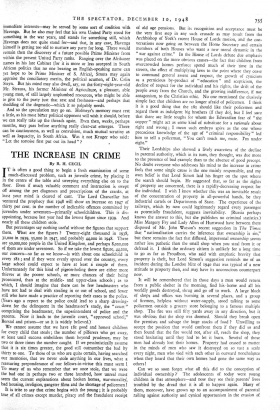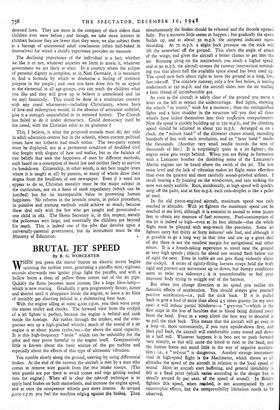THE INCREASE IN CRIME
By R. H. CECIL IT is often a good thing to begin a fresh examination of some much-discussed problem, such as juvenile crime, by placing it in the centre of the table and sweeping everything else on to the floor. Even if much valuable comment and instruction is swept off among the pet diagnoses and prescriptions of the cranks, at least your mind is cleared of cant. The Lord Chancellor has ventured the prophecy that 1948 will show an increase on 1947 of thirty per cent; in the number of indictable offences committed by juveniles under seventeen—primarily schoolchildren. This is dis- appointing, because last year had the lowest figure since 1939. And nearly all these children stole.
But percentages say nothing useful without the figures that support them. What are the figures ? Twenty-eight thousand in 1938, 31,000 in 1939, 35,000 in 1947, and probably 44,000 in 1948. There are 50,000,000 people in the United Kingdom, and perhaps 8,000,000 of them are under seventeen. So if we take the lowest figure, 44,000, our concern—so far as we know—is with about one schoolchild in every 182 ; and if they were evenly spread over the country, every large school could expect to have at least a couple of them. Unfortunately for this kind of pigeon-holing there are either more thieves at the poorer schools, or more chances of their being prosecuted, than at the middle- and upper-class schools ; as to which, I should imagine that there can be few headmasters who have not had to deal with stealing in or out of school, and fewer still who have made a-practice of reporting their cases to the police. (Years ago a report to the police could lead to a sharp dressing- down for the delinquent in the headmaster's study, the " court " comprising the headmaster, the superintendent of police and the parents. Now it leads to the juvenile court, "approved school," Borstal and prison--or so it is widely believed.) We cannot assume that we have ai good and honest children for every child that steals ; the number of pilferers who get away, at least until success emboldens them beyond prudence, may be two or three times the number caught. If we pessimistically assume that it is six times greater, the good still outnumber the bad by thirty to one. To those of us who are quite certain, having searched our memories, that we never stole anything in our lives, what a reassuring preponderance of our fellows-in-virtue this must seem I. To many of us who remember that we once stole, that we were the bad one in perhaps two or three hundred, how unreal must seem the current explanations about broken homes, war-morality, bad housing, irreligion, gangster films and the shortage of policemen I It is trite to say that crime begins with the young ; it is probably true of all crimes except murder, piracy and the fraudulent receipt of old age pensions. But its recognition and acceptance must be the very first step in any such crusade as may result from the Archbishop of York's recent House of Lords motion, and the con- versations now going on between the Home Secretary and certain members of both Houses who want a new moral dynamic in the " war against crime." In the House of Lords debate due emphasis was placed on the more obvious causes—the fact that children from overcrowded homes perforce spend much of their time in the streets, the effect of multiplying laws to the point where they cease to command general assent and respect, the growth of cynicism as a pernicious by-product of " education " and scepticism, the decline of respect for the individual and his rights, the drift of the people away from the Church, and the growing indifference, if not antagonism, to the Christian ethic. No one mentioned the elusively simple fact that children are no longer afraid of policemen. I think it is a good thing that the 181 should like their policemen and regard them as indulgent big brothers (if they do), but I feel sure that there are little toughs for whom the Edwardian fear of " the copper " might act as some kind of substitute for a rationale about right and wrong ; I mean such embryo spivs as the one whose precocious knowledge of the age of "criminal responsibility" led • him to tell a policeman, " You can't touch me, mate. I'm under eight."
Their Lordships also showed a lively awareness of the decline in parental authority, which in its turn, they thought, was due more to the presence of bad example than to the absence of good precept. No doubt everyone who addresses his mind to the increase in crime feels that some single cause is the one mainly responsible, and my own belief is that Lord Simon laid his finger on the spot where the search should begin. He suggested that, so far as the rights of property are concerned, there is a rapidly-decreasing respect for the individual. I wish I knew whether this was an inevitable result of the concentration of property in all-powerful hands, be they industrial cartels or Departments of State. The experience of the railways, which by now could legitimately regard every passenger as potentially fraudulent, suggests inevitability. (Russia perhaps knows the answer to this, but she publishes no criminal statistics.) Miss Margery Fry and Lady Allen of Hurtwood have between them disposed of Mr. John Watson's recent suggestion in The Times that " nationalisation carries the inference that ownership is sin," but there remains the fact that diffused, impersonal ownership seems rather less pathetic than the small shop when you steal from it or defraud it. I think the ordinary citizen is unlikely for a long time to go as far as Proudhon, who said with emphatic brevity that property is theft, but Lord Simon's suggestion reminds me of an incident during the London blitz of 194o that was typical of a new attitude to property then, and may have its unconscious counterpart now.
It will be remembered that in those days a man would return from a public shelter in the morning, find his • home and all his worldly goods destroyed, shrug and go off to work. A large block of shops and offices was burning in several places, and a group of firemen, helpless without water-supply, stood talking to some policemen outside a grocery store belonging to a famous multiple shop. The fire was still fifty yards away in any direction, but it was obvious that the shop was doomed. Should they break open the premises and salvage the huge stocks of food ? Unwilling to accept the position that would confront them if they did' so and then found that the fire would not, after all, reach the shop, they stood htsitating until they had to let it burn. Several of those men had already lost their homes. Property had ceased to matter in the minds of men who saw it destroyed on so vast a scale every night, men who vied with each other in outward nonchalance when they heard that their own homes had gone the same way as others!
Can we so soon forget what all this did to the conception of individual ownership ?* The adolescents of today were young children in that atmosphere—and now they see their. parents' lives troubled by the dread that it is all to happen again. Many of them, moreover, have grown up to an accompaniment of parental railing against authority and cynical opportunism in the evasion of
detested laws. They are more in the company of their elders than children ever were before ; and though we take more interest in children because they are fewer than they were, we also subject them to a barrage of uncensored adult conclusions (often half-baked in themselves) for which a child's experience provides no measure.
The declining importance of the individual is a fact, whether we like it or not, whatever societies we form to arrest it, whatever government we are likely to elect. In a country where the eclipse of personal dignity is complete, as in Nazi Germany, it is necessary to find a formula by which to dramatise a feeling of common purpose in the people ; and once you have done this by an appeal to the elemental in all age-groups, you can teach the children what you like and they will grow up to believe it unmolested and (as we say) fanatically. This could be done in a totalitarian country with any creed whatsoever—including Christianity, whose basis of love and redemption would, in the absence of articulate unbelief, give it a strength unparalleled in its tortured history. The Church has failed to do it under democracy. Could democracy itself be the creed, with the Christian ethic as its grammar ?
This, I believe, is what the proposed crusade must do, not only in adult education centres but in the schools, where current political issues have not hitherto had much notice. The two-party system must be displayed, not as a permanent condition of modified civil War fought with slogans of hate and malice, but as the balance of two beliefs that seek the happiness of men by different methods, each based on a conception of moral law and neither likely to survive its breakdown. Citizenship, in other words, is not best taught (even where it is taught at all) by parents, so many of whom draw their dogma from the headlines of one newspaper. Even if it need not appear to do so, Christian morality must be the major subject in the curriculum, not on a basis of stark expediency (which can be justified) but for its incomparable value in promoting human happiness. No reforms in the juvenile courts, in police procedure, in punitive and training methods could achieve so much, because these deal only with the few who get caught and prosecuted— one child in 182. The Home Secretary is, in this respect, merely the policeman writ large, and essentially the children are beyond his reach. This is indeed one of the jobs that devolve upon a universally-parental government, but its instrument must be the Ministry of Education.















































 Previous page
Previous page